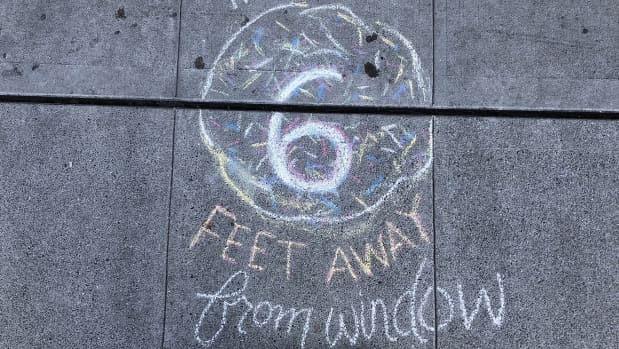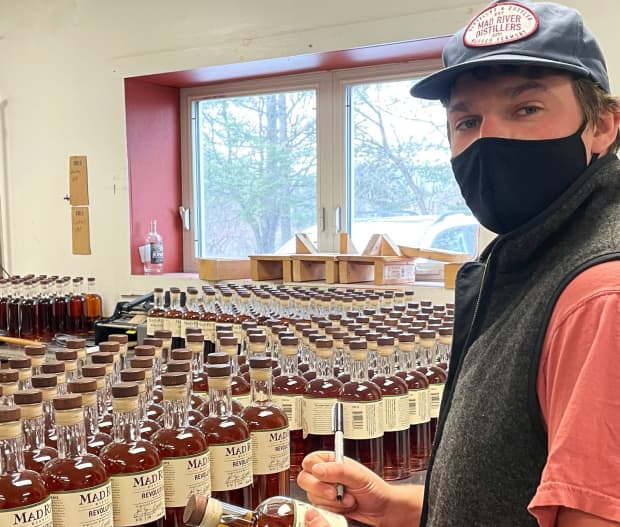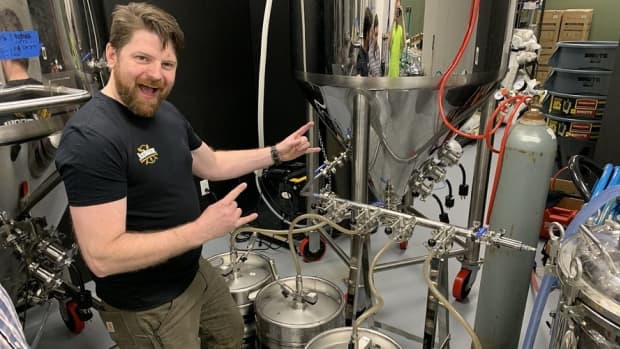Last March, in the frantic few weeks that felt as if the world was falling apart, MarketWatch interviewed four small business owners from around the country. No-one had a playbook for how a global pandemic would play out, much less how it would impact their own lives – but each had already seen their businesses upended and was nervous about what lay ahead.
Six months on, with the long dark winter looming, we checked in again. And this week, at the one-year mark, we decided to close the loop. With vaccinations ramping up and the outdoor-dining season ahead, our interviewees were optimistic.
“We see the light at the end of the tunnel, and for the first time in a while, it’s not an oncoming train,” said Matt Bell, owner of The Shop in Seattle and Dallas.
All four made it through the past 12 months far better than they’d expected, but only after course corrections they never could have imagined.
Was it luck or hard work? A combination, certainly. Our subjects embraced the chaos and found ways to adapt. They also know plenty of other owners who would love to have had the chance to do the same work, but who simply ran out of money, time, or good health.
Earlier coverage:
These small-business owners made their dreams come true — and then the coronavirus hit
These small-business owners are still making it work, coronavirus and all
‘We had little glimpses of, this is what it used to be like’
Hello Robin is a Seattle-based cookie chain with a cult following. After several years in business, shop owners Robin Wehl Martin and her husband, Clay Martin, were in the midst of an expansion to a second location when coronavirus struck.
Shortly after speaking to MarketWatch last March, Robin was forced to temporarily shut down the original shop, in the hip — and hipster — Capitol Hill neighborhood. “I was ready to give up,” she said in October.
Now, reflecting back, she calls it “such a roller coaster.”
“There were just days where I thought, this is so awful. Then there were days like when the local pizza place swooped in and bought 20,000 cookies. It’s just day to day.”

The Capitol Hill store reopened in early June, and the Martins donated revenue from that first weekend to Black Lives Matter organizations in honor of Juneteenth. That was a busy weekend, with people excited to be out and about, but later in the year, wildfire smoke kept most Seattlites indoors for several days — and on Valentine’s Day, traditionally one of the shop’s busiest of the year, a blizzard hit.
There were additional expenses, as well, including making changes to the construction plans for the new location, in University Village, an outdoor shopping center, to accommodate a takeout window.
The Martins tapped into their home equity, they said, and received a Paycheck Protection Program loan from Square, but haven’t even had time to consider applying for the loan to be forgiven.
“It’s pretty tragic for a lot of businesses out there,” Clay said this month. “I don’t want to minimize the impact it’s had on so many businesses, but overall there is a feeling of optimism. I think there’s going to be an explosion of business opportunity with good weather, more hands-on leadership at the federal level, and the vaccines.”
What is the biggest takeaway from the past year? “I think early on as a business owner I had this idea that you have to work really hard to get things going, but then you’re at cruising altitude and then you can sit back and relax,” Clay said. “But it’s never like that. Now I realize there’s always going to be things.”
“A lot of good is going to come from this, business-wise and society-wise, because we’ve been forced to adapt,” Robin said.
‘Everyone’s feeling like this is a very different spring’
In March 2020, when MarketWatch talked to John Egan, co-founder of Warren, Vt.-based Mad River Distillers, the company was producing hand sanitizer for the local community. Egan called it “as much a community-building exercise as anything else,” when we checked in in October.
The effort didn’t last long, and Mad River made it through the summer at reduced capacity and with the help of one PPP loan, which has been forgiven, and later a second, taken out to keep people on payroll.
“We feel good that we ran the business pretty conservatively,” Egan said this month. “It’s the best thing we did, being able to keep everyone employed.”

MAD RIVER DISTILLERS
Egan knows he was lucky. “There are a lot of passionate people in the hospitality industry and lots that have been doing anything they can to be stay in business. We saw people selling down their wine cellars, doing everything they could just to stay alive. There will be a lot of businesses that don’t reopen or that reopen under new management.”
The pandemic had a silver lining, Egan thinks. The discussion of supply chain issues and renewed interest in the provenance of ingredients and materials over the past year will be a boon for local artisans, he believes. “Coming out of this, where things come from and what they’re made out of will be important to people, which will help us.”
Another potential boon: after twelve months of being stuck at home, in most cases drinking inferior alcohol, people seem thirsty for the luxury of having drinks mixed for them.
One other big change over the past year was the ability to deliver alcohol, for which there was great demand, but required liberalization of rules and laws, Egan said. “I think it’s going to be tough to put that genie back in the bottle. I think that’s going to be good for the distilling industry and also good for consumers.” He points to the recent acquisition of alcohol delivery service Drizly by Uber
UBER,
Foremost, though, Egan is most focused on the impact on what he calls a “high-touch, in-person” industry. “A lot of workers have had a tough time over the past year,” he said. “Unsung heroes of the last year are people in the grocery stores, in the restaurants. They had to show up, and they did their jobs.”
‘I trust politicians less because I can’t understand their motives and I don’t feel like they’re based on facts and numbers’
Matt Bell was unique among our interviewees: he’d started a successful business in Seattle and was in the midst of expanding to Dallas when the pandemic hit. Construction halted for months, but the carrying costs didn’t, and the Seattle location wasn’t at full capacity through much of 2020. The business is called The Shop, and it offers car aficionados a place to work on their vehicles and socialize.
Bell has gone back and forth between the two cities for months. His bifurcated experience has been unsettling, he said.
“There is a crazy amount of excitement and exuberance for what we’re doing down in Dallas, and I can’t tell if it’s specific to the market or if it’s just that Texans in general are less apprehensive to get out there in the world and see other people, whereas in Seattle there’s a lot of guilt and shame if you want to even go out to eat outdoors,” Bell told MarketWatch. “There’s a certain amount of social pressure in Seattle that has really stifled and frightened people, and Texas is kind of the opposite. I think somewhere in the middle is the right place to be.”
The pandemic brought lessons for business owners, Bell said: “Our employees really stepped up. Sometimes when we were on partial lockdown, some people worked two or three different jobs because we couldn’t afford to keep everyone on. It’s so important to build loyalty because we wouldn’t have been able to run the business without people being flexible and adjusting to doing jobs they weren’t accustomed to. It showed that we need to take care of our employees and make sure they feel valued.”
But ultimately, he found himself struck by how impactful government leadership can be– as exemplified by the two different cities he’s split his time in.
While the dynamics are probably region-specific, he said, “I can’t tell if our economy is in great shape or on the brink of disaster. So many people are suffering and so many are doing well. I feel like it’s hard to tell which way to steer my business. Am I investing to grow or am I holding back some savings because we might have some tough times ahead?”
Bell received PPP money in both rounds of funding, but was startled to find that the reporting requirements for the loans had changed under the Biden administration, he said. “It’s crazy onerous.” Still, he expects both loans to be largely forgiven.
‘We see regulars who we haven’t seen in months. It’s nice to be able to see those faces again’
Glassboro, N.J.-based Axe and Arrow Brewing, which makes craft beers, had been open barely a year when the pandemic hit, and “were just starting to hit our stride,” as co-owner Krystle Lockman told MarketWatch last March. In October, she confessed to being “definitely worried about how the winter is going to look.”
The winter did turn out to be “extra slow,” she told MarketWatch this month: both because of the cold and fears about the virus. But, like our other interviewees, Axe and Arrow made a pivot, to selling its products regionally, rather than just in-house.
“We hired a sales guy, and he’s been killing it,” Lockman said. “We really grew our distribution footprint. In November 2019 we ordered a canner that got delivered March 2020, planning to get into it and have it be a slow roll. We had to ramp up a lot sooner and it’s been received well. I think it’s a blessing in disguise.”

AXE AND ARROW BREWING
Lockman thinks the end is in sight. “People will continue to get vaccinated, confidence will continue to rise, and we’ll grow the distribution and re-open the tap room which is our cash cow,” she said. “We’re very optimistic.” One bonus: Axe and Arrow expects to have a nice celebration for its two-year anniversary, in April, after having been closed down for the one-year anniversary.
Her takeaway? “This has showed us a lot about who we were as a company. I really just think from a business perspective, you can only plan for so much before you just have to stay nimble and adapt. Even the best planning can have a complete wrench thrown in it. We hit our projections, just in a very different mix of revenues. For us, it was a little luck and a lot of being adaptable.”







